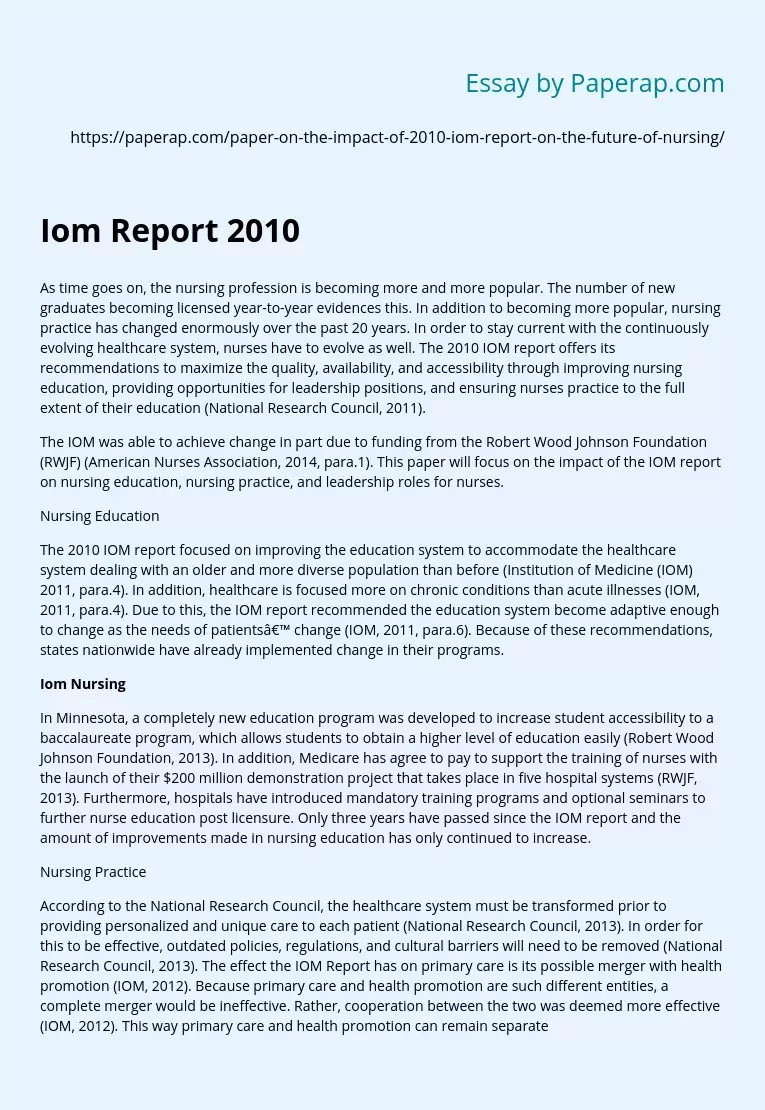Iom Report 2010
As time goes on, the nursing profession is becoming more and more popular. The number of new graduates becoming licensed year-to-year evidences this. In addition to becoming more popular, nursing practice has changed enormously over the past 20 years. In order to stay current with the continuously evolving healthcare system, nurses have to evolve as well. The 2010 IOM report offers its recommendations to maximize the quality, availability, and accessibility through improving nursing education, providing opportunities for leadership positions, and ensuring nurses practice to the full extent of their education (National Research Council, 2011).
The IOM was able to achieve change in part due to funding from the Robert Wood Johnson Foundation (RWJF) (American Nurses Association, 2014, para.1). This paper will focus on the impact of the IOM report on nursing education, nursing practice, and leadership roles for nurses.
Nursing Education
The 2010 IOM report focused on improving the education system to accommodate the healthcare system dealing with an older and more diverse population than before (Institution of Medicine (IOM) 2011, para.
4). In addition, healthcare is focused more on chronic conditions than acute illnesses (IOM, 2011, para.4). Due to this, the IOM report recommended the education system become adaptive enough to change as the needs of patients’ change (IOM, 2011, para.6). Because of these recommendations, states nationwide have already implemented change in their programs.
Iom Nursing
In Minnesota, a completely new education program was developed to increase student accessibility to a baccalaureate program, which allows students to obtain a higher level of education easily (Robert Wood Johnson Foundation, 2013). In addition, Medicare has agree to pay to support the training of nurses with the launch of their $200 million demonstration project that takes place in five hospital systems (RWJF, 2013).
Furthermore, hospitals have introduced mandatory training programs and optional seminars to further nurse education post licensure. Only three years have passed since the IOM report and the amount of improvements made in nursing education has only continued to increase.
Nursing Practice
According to the National Research Council, the healthcare system must be transformed prior to providing personalized and unique care to each patient (National Research Council, 2013). In order for this to be effective, outdated policies, regulations, and cultural barriers will need to be removed (National Research Council, 2013). The effect the IOM Report has on primary care is its possible merger with health promotion (IOM, 2012). Because primary care and health promotion are such different entities, a complete merger would be ineffective. Rather, cooperation between the two was deemed more effective (IOM, 2012). This way primary care and health promotion can remain separate entities still.
In order to meet the goals of the IOM report, I would encourage my practice to expand the diversity of the staff. The more diverse a practice is, the fewer the cultural barriers we need to overcome. In addition, I would stress the importance of individualized care given to each patient. To accomplish this, I would put a stronger emphasis on the individualized care plans for each patient. Nursing practice must evolve as our population and society in general evolves to ensure the most updated, individualized, and relevant care possible.
Nursing Leadership Roles
The 2010 IOM Report recommended nurses to pursue leadership roles in their healthcare setting. In addition, the report also recommends nurses to be full partners with the physicians and other members of the healthcare team to effectively increase the quality of care given to the patients (National Research Council, 2013). Because nurses are such strong advocates for patients, it would truly benefit the patient to have nurses participating in leadership roles.
According to the American Association of Colleges of Nursing, embedding leadership development into the nursing curriculum will have a positive effect on the amount of nurses fulfilling leadership roles in their healthcare setting (American Association of Colleges of Nursing, n.d). As a nurse, I have seen plenty of new graduates over the years. As time goes on, it is evident how better prepared and more motivated the new graduates are from the previous graduates for these leadership roles.
Conclusion
Based on the 2010 IOM Report, our nation is more than capable of accomplishing a complete reformation of our healthcare that will maximize the availability, accessibility, and quality of care given to patients. Nurses, especially, have the opportunity to play the most vital role in the reformation process. Changes in nursing education, nursing practice, and the increase in nurse leadership roles are only a few of the ways change can occur.
Iom Report 2010. (2019, Dec 05). Retrieved from https://paperap.com/paper-on-the-impact-of-2010-iom-report-on-the-future-of-nursing/

